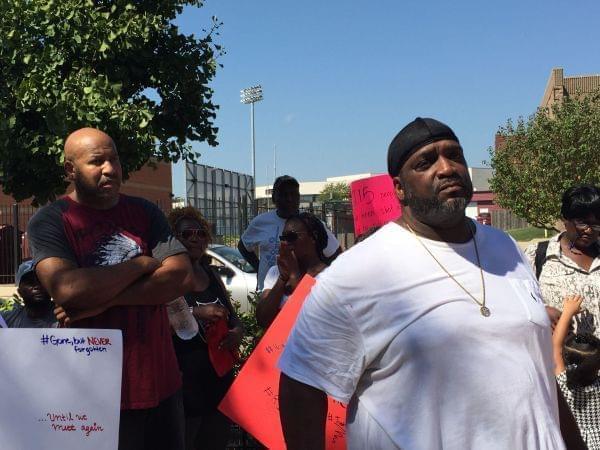Eddie Russell Jr.‘s Family Sues Peoria; Helping Veterans Graduate; Inmates And Mental Health Care

Eddie Russell, Sr. (right), led a protest outside the Peoria Police Department last fall. His son, Eddie Russell, Jr., was shot and killed during a standoff with police on Sept. 20, 2017. The family is suing the city of Peoria and the police department saying the killing was "unjustified," due to Russell Jr.'s mental illness. Cass Herrington/Illinois Public Media
On the 21st: We discussed the case of Eddie Russell Jr., a 25-year old black man who was shot and killed by Peoria police last September—and why his family is now suing the city and the six officers involved in the shooting. And, how some Illinois community colleges are helping veterans to get their degrees and reintegrate into society. Plus, what county jails are doing in effort to connect inmates with proper mental health care in an effort to keep them from coming back.
Last September, Eddie Russell Jr, a 25-year old black man, was shot and killed by six police officers outside his family’s home in Peoria. His family says he was shot while lifting a garage door. Police, on the other hand, say he had a gun and was suspected of robbing a bank.
Those six officers have since been cleared of any wrongdoing by Peoria county state’s attorney. So on Sunday, Eddie Russell Jr’s family decided to take this to federal court. They’ve now sued the City of Peoria and the six police officers involved in this shooting.
Eugene Daniel, news anchor for WMBD and Reverend Marvin Hightower, President of the NAAP in Peoria joined us today to talk about the matter.
"You have two completely different narratives: one in the lawsuit by the family, and one by the authorities."
— The 21st (@21stShow) June 19, 2018
—@eugenedanielTV, on the death of Eddie Russell Jr., who was shot and killed by police officers last fall.
Plus-
For many veterans, the adjustment back to civilian life can be extremely difficult. So ten years ago, Congress allocated tens of billions of dollars’ for veterans’ college expenses in what’s known as the 9/11 G-I bill.
But the graduation rates of veterans across the country are still suffering, especially at community colleges. An independent review of federal data found that an average of only 15 percent of full-time students at community colleges receiving GI Bill money graduated with a two-year degree in 2014. That’s according to the most recent data.
McHenry County College in Crystal Lake is one of a handful of community colleges working on addressing this issue. At McHenry the “Journey Home Project” allows veterans to enroll in a series of humanities courses designed to help them reintegrate into society and get their degrees.
We spoke with two instructors from McHenry County College who are involved with The Journey Home Project. Mark Waters is an english instructor and Todd Culp is a history and political science instructor.
"If your story doesn't fit the narrative, the story that everybody back home has heard, we don't always want to hear your story."
— The 21st (@21stShow) June 19, 2018
English instructor Mark Waters says part of Journey Home is challenging this idea and allowing ALL vets to tell their own unique stories.
And-
Roughly one in four jail inmates shows signs of a serious mental illness. And two-thirds of them never receive treatment. Those numbers come from the U.S. Department of Justice. Getting proper mental health care in jail is a constitutional right. Adding to that, experts say mental health treatment can also keep inmates from coming back.
Some Illinois county jails want to step up mental health screening, to stop the revolving door of inmates who aren’t getting the right treatment.
We were joined in studio by Allen Jones, Deputy Chief of the Champaign County Jail. On the line with us from New York was Richard Cho. He directs the behavioral health division of the Council of State Governments Justice Center. Also in the studio was Christine Herman, a reporter with Illinois Public Media and Side Effects News.
Deputy Chief Allen Jones of Champaign County Jail in the studio with @CassHerrington & @CTHerman to talk about ways to keep people with mental health issues out of jail...coming up @willpublicmedia @SideEffectsNews @ChampCoSheriff pic.twitter.com/GOT28YaXbJ
— The 21st (@21stShow) June 19, 2018

